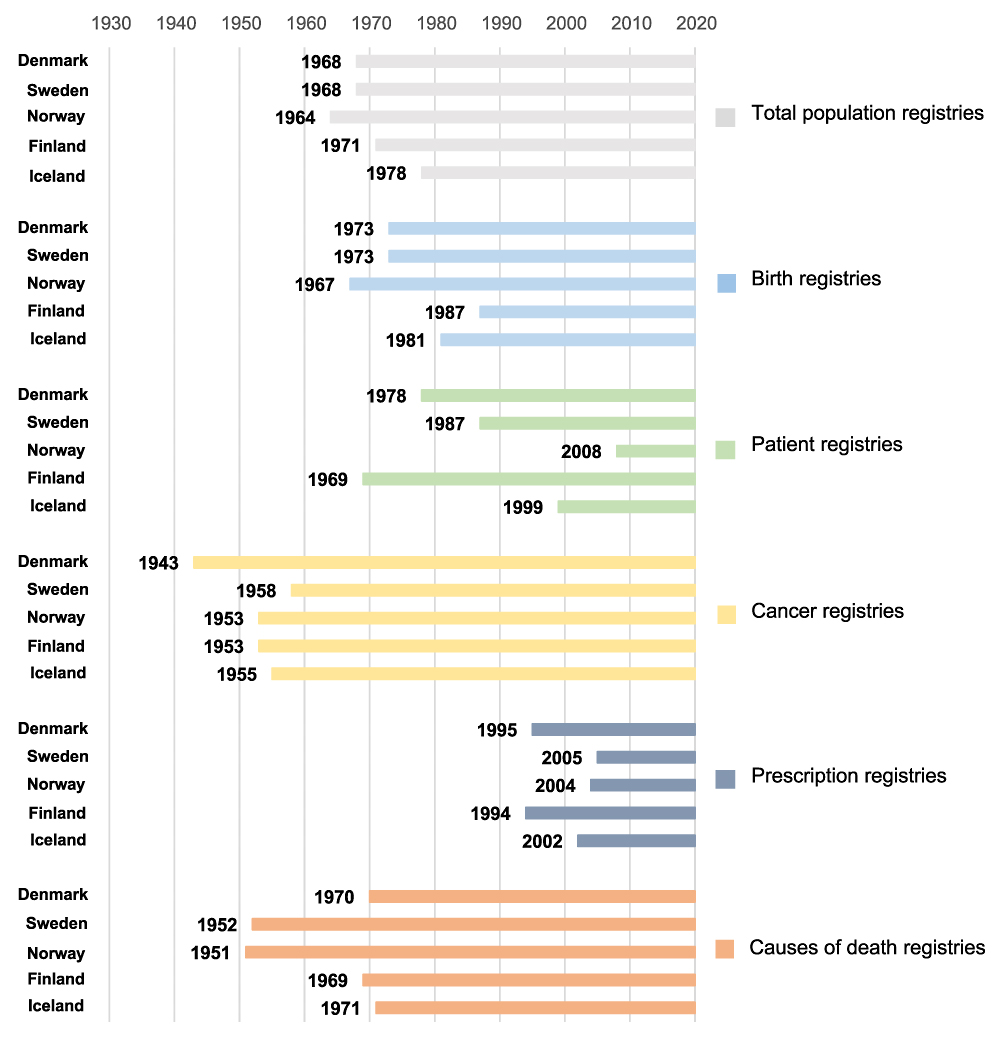By Carol Cruzan Morton
13 September 2021. In each Nordic country, health registries have been an important part of modern medical research, but together the data can do more. So says a new review of health care systems and key national registries in Denmark, Finland, Iceland, Norway, and Sweden.
“The wide range of population-based registries and databases, as well as surveys and biobanks, make the Nordic countries a goldmine for joint health registry-based research,” write Kristina Laugesen of Aarhus University Hospital in Denmark and her coauthors.

registries. Credit: Courtesy Dove Press/Laugesen et al.
The registries contain data from about 27 million Nordic citizens. The registries are similar enough to merge the data into larger cohorts. Some efforts are underway, but significant obstacles remain.
To foster more regional studies, authors from five Nordic countries teamed up to offer a guide to help other researchers navigate the practical and legal aspects of setting up Nordic collaborations. The review provides an impressive overview of the Nordic health systems and detailed information on the many registries in the Nordic countries. The July 19 paper in the journal Clinical Epidemiology is co-authored by researchers from all five countries.
For all of these countries' similarities – universal access to health care, long-term follow-up, personal identity numbers to link data across registries – combining the data into larger research cohorts presents challenges. For example, the validity and completeness of diagnosis may not be consistent across borders.
Legal and practical difficulties pose some of the biggest barriers to health research with joint Nordic data resources, the authors write. Those include long delays to get the necessary permissions and, in the case of Denmark, a requirement that data must stay in the country and cannot be transferred to a remote server.
The paper describes key government-administered registers: Total population, birth, patient, prescription, cancer, and causes of death. The authors note the existence of other registries and databases with socioeconomic data, numerous disease or procedure registries, clinical quality databases and registries, surveys, researcher-initiated cohorts, and biobanks.
In a Twitter conversation about the other registries, co-author Jonas Ludvigsson of the Karolinska Institute and Orebro University Hospital referred a question to other reviews, such as one he co-authored about physician-led health registries on specific disorders.
The authors do not reference precision medicine, but the same pooled data can be integrated with genomic information to enable detailed study of the causal effects of genetic variants in disease, as well as potential prevention and treatment (as the founders of NSHG-PM described in their roadmap editorial).
Citations
Nordic Health Registry-Based Research: A Review of Health Care Systems and Key Registries.
Laugesen K, Ludvigsson JF, Schmidt M, Gissler M, Valdimarsdottir UA, Lunde A, Sørensen HT.
Clin Epidemiol. 2021 Jul 19;13:533-554.
Review of 103 Swedish Healthcare Quality Registries.
Emilsson L, Lindahl B, Köster M, Lambe M, Ludvigsson JF.
J Intern Med. 2015 Jan;277(1):94-136.
Roadmap for a precision-medicine initiative in the Nordic region.
Njølstad PR, Andreassen OA, Brunak S, Børglum AD, Dillner J, Esko T, Franks PW, Freimer N, Groop L, Heimer H, Hougaard DM, Hovig E, Hveem K, Jalanko A, Kaprio J, Knudsen GP, Melbye M, Metspalu A, Mortensen PB, Palmgren J, Palotie A, Reed W, Stefánsson H, Stitziel NO, Sullivan PF, Thorsteinsdóttir U, Vaudel M, Vuorio E, Werge T, Stoltenberg C, Stefánsson K.
Nat Genet. 2019 Jun;51(6):924-930.

